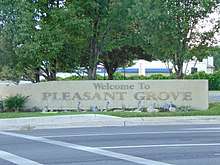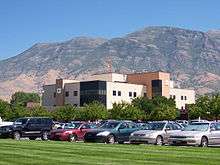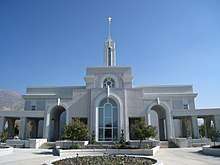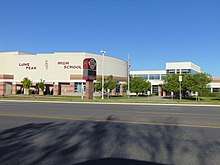Utah State Route 129
State Route 129 (SR‑129) is a state highway in northern Utah County, Utah, United States. The route spans (mostly) north-south for 7.27 miles (11.70 km)[1] to connect U.S. Route 89 (US‑89) on the Lindon-Pleasant Grove line with SR‑92 in Highland.[3] The majority of the route runs along North County Boulevard.
| ||||
|---|---|---|---|---|
| Route information | ||||
| Defined by Utah Code §72-4-118 | ||||
| Maintained by UDOT | ||||
| Length | 7.270 mi[1] (11.700 km) | |||
| Existed | 2014[2]–present | |||
| Major junctions | ||||
| South end | ||||
| ||||
| North end | ||||
| Location | ||||
| Counties | Utah | |||
| Highway system | ||||
| ||||
Route description

SR‑129 is a four-lane highway that runs through the northeastern Utah Valley. Much of the route runs through land that was formerly agricultural, but has recently become commercialized.
The route begins at the intersection of State Street (US‑89) and 700 North (Lindon)/1000 South (Pleasant Grove) on border of those two cities. (1000 South continues east in Pleasant Grove, but rapidly enters Lindon as 800 North.) From its southern terminus, the route heads west-southwest on 700 North and quickly leaves the business district to enter an industrial area. Just before connecting with the north end of a short section of 800 West, the route curves due west and continues in that direction until it crosses Geneva Road (SR‑114). West of North Geneva Road the route continues on to connect with the northern end of 1700 West and then starts curving slightly north. Next it connects with the north end of 2000 West and then crosses the Lindon-Pleasant Grove line at the south end of 1300 West.[1][3]
Heading northwest in Pleasant Grove, SR‑129 crosses Pleasant Grove Boulevard (SR‑135), which runs southwest to connect with Interstate 15 (and on to 2800 West in Lindon). After connecting with the northeast end of Grove Parkway, SR‑129 continues its curve to the north and becomes North County Boulevard (2000 West). Before completing is curve to the north, the route connects with the west end of 250 South and then continues through residential area. Now heading due north, SR‑129 connects with the east end of 390 North before crossing State Street (US‑89). North of State Street, the road becomes 1100 East as it runs along the border of American Fork and Pleasant Grove. After crossing Pacific Drive (American Fork)/680 North (Pleasant Grove) and Bamberger Drive (American Fork)/ 800 North (Pleasant Grove) it connects with the west end of 930 North (Pleasant Grove) before reaching 50 South (American Fork)/1100 North (Pleasant Grove).[1][3]

North of that intersection, now entirely within American Fork, SR‑129 connects with the east end of 30 North, the west end of 50 North, the east end of 70 North, the west end of 80 North, and the west end of 120 North. It then passes between the Dan Peterson School (on the west) and Intermountain Healthcare's American Fork Hospital (on the east). SR‑129 then connects with the west end of 180 North and the east end of 220 North before crossing 300 North. Continuing north the route connects with the east end of 380 North, the west end of 400 North, the east end of 490 North, the west end of 530 North, the east end of 560 North, the west end of 580 North Circle, and the east end of 600 North before crossing 700 North.[1][3]

North of 700 North, SR‑129 passes between the LDS Church's Mount Timpanogos Utah Temple (on the west) and the private American Heritage School (on the east) before curving briefly northwest. After connecting with the west end of 770 North the route crosses 900 East/1000 North and curves back to a due north heading to become 900 East. Passing by the west side of the Utah State Developmental Center, the route connects with the east end of center's primary access, 980 North (as well as the connection to SR‑296). SR‑129 then connects with the west end of 1100 North, the west end of 1300 North, and the west end of Murdock Drive, before becoming 4800 West as it runs along the Highland-American Fork line.[1][3]

Continuing due north, SR‑129 connects with the west end of 1520 North Circle before crossing over the Murdock Canal Trail, which runs along the (now buried) Murdock Canal.[4] It then connects with the west ends of Harvey Boulevard,[lower-alpha 1] 1750 North, and 1800 North, before leaving American Fork and running along the Highland-Cedar Hills line. Just before entirely entering Highland, SR‑129 crosses Cedar Hills Drive.[1][3]
As SR‑129 fully enters Highland, it passes by the west side of Lone Peak High School. Next it connects with the west ends of 10370 North and Killarney Drive before crossing Knight Drive/Old Bish Lane. After connecting with the west end of Caddie Lane, it crosses over the American Fork (river) and then connects with the west end of Canyon View Drive and Vista Drive. Finally, it crosses Country Club Drive and West Panorama Drive before reaching its northern terminus at the Timpanogos Highway (11000 North/SR‑92). (4800 West continues north into Alpine, where it becomes South Canyon Crest Road.[1][3]
Legal definition
The legal definition of State Route 129 is as follows:
72-4-118. State highways—SR-121 to SR-130.
(9) SR-129. From Route 89 in Lindon westerly on 700 North; then northerly on North County Boulevard to Route 92 in Highland.[6]
Traffic
The Utah Department of Transportation (UDOT) collects data for the State Highways and Local Federal-Aid roads. Traffic is measured in both directions and reported Annual Average Daily Traffic (AADT). AADT is collected for major intersections and “sections where traffic volumes show a substantial increase or decrease.”[7] The busiest section of SR‑129 is between Geneva Road (SR‑114) and Pleasant Grove Boulevard (SR‑135), with an average of 21,000 vehicles per day. The least busy section of SR‑129 is between 700 North and Cedar Hills Drive, with an average of 10,000 vehicles per day. Since 2008, traffic along the busiest section has increased an incredible 2,000 percent and traffic on the least busy section has increased only 8 percent.[8]
In addition to the travel restrictions for oversized vehicles that UDOT has established that apply to all state highways in Utah, SR‑129 has additional restrictions which also apply to rush hour travel along most of the Wasatch Front. Specifically, travel by oversized vehicles is restricted on all highways in Utah County north of the North Springville/South Provo Interchange (Exit 361) Monday through Friday from 6:00 am to 9:00 am and from 3:30 pm to 6:00 pm.[lower-alpha 2][9][10]
History
The original SR‑129 was established in 1931 as a road between Moab and Castleton (via Castleton Junction) in southeastern Grand County.[11] However, just a few years later, in 1933, the roadway that ran (mostly along the Colorado River) northeast from Castleton Junction to Cisico was completed. The greater part of SR‑129 was then added to SR‑128, which continued north-northeast from Castleton Junction along the new road to Cisico[12] The section that ran southeast from Castleton Junction to Castleton was deleted from the state highway system. The original SR‑129 was immediately replaced (in 1933) with a road in east-central Beaver County, which was referred to as the loop off SR‑21 southeast of Milford. The second SR‑129 began on SR‑21 about 5.8 miles (9.3 km) south-southeast of Milford and ran due east along East 4500 South (Cates Road) for about 2.1 miles (3.4 km) and then due north for about 4.5 miles (7.2 km) to reconnect with SR‑21 in southeast Milford. The second SR‑129 was deleted in 1969, along with nearly a hundred other Utah state highways and the SR‑129 designation remained unused until 1982. In that year a third SR‑129 was established in northeastern Box Elder County. That iteration of SR‑129 connected I‑15 west of Riverside with SR‑30 at Collinston Junction (north of Collinston). Less than a decade later, that section of highway was added to SR‑30 and the SR‑129 designation again remained unused, this time for 25 years.[2]
By 2014, the third and final phase of North County Boulevard was completed in northeastern Utah County. (The first phase was completed in 2011, the same year second phase began.)[13] While much of the Boulevard was built upon existing roads, the project connected the roads and created a five-lane corridor from the west end of 700 North in Lindon to the Timpanogos Highway (SR‑92) in Highland. Once the project was finalized, it was designated, along with an improved 700 North in Lindon, as SR‑129. In exchange of mileage, SR-146, a road parallel to SR-129, was cancelled.[14][2] Since its establishment in 2014, the only significant change along SR‑129 has been the designation of Pleasant Grove Boulevard (west of North County Boulevard) as SR‑135.[15]
Major intersections
The entire route is in Utah County. [1]
| Location[1] | mi[1] | km | Destinations[3] | Notes | |
|---|---|---|---|---|---|
| Lindon–Pleasant Grove line | 0.000 | 0.000 | Southern terminus | ||
| Lindon | 0.474 | 0.763 | |||
| 0.543 | 0.874 | Utah Transit Authority Railroad tracks - Future TRAX right-of-way | |||
| Lindon–Pleasant Grove line | |||||
| Pleasant Grove | 1.782 | 2.868 | |||
| American Fork–Pleasant Grove line | 2.959 | 4.762 | |||
| 3.339 | 5.374 | 50 South west (American Fork)/1100 North east (Pleasant Grove) | |||
| American Fork | 3.849 | 6.194 | 300 North - Pleasant Grove | ||
| 4.453 | 7.166 | 700 North - Pleasant Grove | |||
| 980 North west - To SR‑296, Utah State Developmental Center | |||||
| 5.592 | 8.999 | Murdock Canal Trail underpass and Murdock Canal crossing | |||
| American Fork–Highland line | |||||
| Highland–Cedar Hills line | 6.143 | 9.886 | Cedar Hills Drive | ||
| Highland | 6.832 | 10.995 | Bridge over the American Fork | ||
| 7.270 | 11.700 | Northern terminus | |||
| 1.000 mi = 1.609 km; 1.000 km = 0.621 mi | |||||
Notes
- The west end of Harvey Boulevard at North County Boulevard (SR‑129), on the Highland-American Fork line, will be the west end of what is referred to as the Murdock Connector. The Murdock Connector is a planned "east–west corridor connecting Highland to American Fork between State Route 92 to the north, and 300 North on the south." It will start at the intersection of the Alpine Highway (SR‑74) and West 9860 North on the Highland-American Fork line and head east to cross over the American Fork (river) and then jog to the north before continuing east to connect with North County Boulevard (SR‑129) at Harvey Boulevard.[5]
- The Utah Department of Transportation (UDOT) defines oversized vehicles as any vehicle exceeding any of the following: 10 feet (3.0 m) in width, 105 feet (32 m) in overall length, or 14 feet (4.3 m) in height. Oversized vehicles are prohibited on all state highways in Utah (unless otherwise permitted) during designated and defined major holidays periods (holiday periods exceed the actual day of the holiday). Oversized vehicle are also prohibited Monday through Friday from 6:00 am to 9:00 am and from 3:30 pm to 6:00 pm on all highways within the following areas:
- All highways in Box Elder County south of the Perry/Willard Interchange (Exit 357) on I‑15/I‑84,
- All highways in Davis, Salt Lake, and Weber counties (expressly including all of I‑80 in Salt Lake County and all of I‑84 in Weber County), and
- All highways in Utah County north of the North Springville/South Provo Interchange (Exit 361) on I‑15 (including SR‑68 north of mile post 16).
References
- "Highway Referencing: Route 129" (PDF). drive.google.com. Utah Department of Transportation. September 15, 2016. Retrieved July 6, 2020 – via Data, Technology & Analytics Division: Highway Reference & State Road Resolutions Information.
- "Highway Resolutions: Route 129" (PDF). drive.google.com. Utah Department of Transportation. December 2014. Retrieved July 6, 2020 – via Data, Technology & Analytics Division: Highway Reference & State Road Resolutions Information.
- Google (May 18, 2018). "N County Blvd" (Map). Google Maps. Google. Retrieved May 18, 2018.
- U.S. Geological Survey Geographic Names Information System: Murdock Canal
- Neeley, Karissa (October 8, 2017). "North Utah County residents discuss Murdock Connector". Daily Herald. Provo, Utah. Retrieved May 18, 2018.
- "72-4-118 State highways: SR-121 to SR-130". Utah State Legislature. 2015. Retrieved May 7, 2018.
- 2016 Average Annual Daily Traffic (XMLX) (Report). Utah Department of Transportation. Retrieved May 13, 2018.
- 1981–2016 Average Annual Daily Traffic (XMLX) (Report). Utah Department of Transportation. Retrieved May 4, 2018.
- "Chapter 23: General Highway Restrictions". Utah Department of Transportation. Retrieved June 6, 2016.
- "Utah Administrative Code: R909. Transportation, Motor Carrier: Rule R909-2. Utah Size and Weight Rule". Utah Department of Administrative Services. May 1, 2016. Retrieved June 6, 2016.
- Utah State Legislature (1931). "Chapter 55: Designation of State Roads". Session Laws of Utah.
(129) From Moab along south bank of Colorado river to Castletown.
- Utah State Legislature (1933). "Chapter 30". Session Laws of Utah.
(128) From Moab along south bank of Colorado river to Cisco.
- Christiansen, Barbara (January 29, 2011). "Construction on North County Blvd. moving ahead". Daily Herald. Provo, Utah. Retrieved May 18, 2018.
- "North Utah County Boulevard Roadway Project". gosci.com. Retrieved May 7, 2018.
- "Highway Referencing: Route 135" (PDF). Utah Department of Transportation. August 10, 2016. Retrieved May 23, 2018.
External links
| Wikimedia Commons has media related to Utah State Route 129. |
